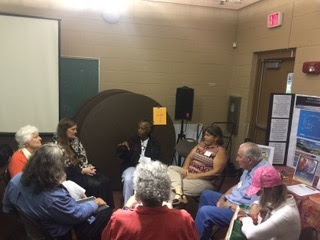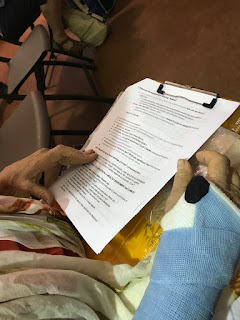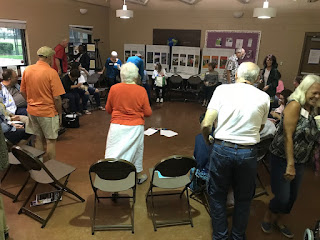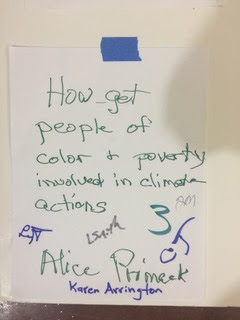DISCUSSANTS
- Amanda Young
- Maria Sgambati
- John Heimberg
- Joyce Johnson
- Timothy Kirby
- Kim Wells
- Hannah Holland
- Houston R. Cypress
Engaging local knowledge is vital.
Traditional Ecological Knowledge
Crafting liturgy that includes respectful language, preferred gender pronouns, new pronouns like "XIE" and others.
Houston was afraid that this event was going to be transphobic and not educated on gender diversity concerns.
Gender is a spectrum.
Some people want training or education on gender diversity, proper terminology, history of trans issues from indigenous perspectives.
Two-Spirit Elder Sharon Day as a water activist.
Fracking wastewater disposal in low-income and minority communities.
Some communities have an overabundance of influence and can mobilize dollars and votes to protect their interests and communities.
Money talks.
Not all communities can mobilize millions of dollars, or be able to whisper their priorities to decision makers in back rooms privately.
Some corporate managers and captains of industry just don't value human life equally.
The judicial system monetizes lives.
For example, insurance companies do that as a matter of course.
The ability to be able to go out into the world with a voice and the intention to fight — is a privilege.
Some people are rightfully prioritizing feeding their families and paying bills.
Other obstacles include cronyism and nepotism and the good ol' boys network.
Tampa / St. Pete as locations dealing with drainage problems during heavy rains.
Geographic issues in that area make it highly susceptible to the negative impacts that hurricanes bring.
Most vulnerable to storm surge.
In Miami, people are moving more inland due to Sea Level Rise.
King Tides are serious problems, and their occurring at odd times of the month.
Official notifications from local officials being distributed through neighborhood associations aren't getting to everyone.
People living in apartments are not notified.
New notifications methods that are more inclusive are needed.
What are your experiences in dealing with official agencies on water issues?
Miccosukee Tribe deals with Army Corps, for example, and they have to air their grievances from colonization and genocide before getting to substantive environmental issues. Although airing grievances is necessary, it can also be tedious and frustrating.
Official apathy from officials.
Zoning issues.
Property valuation.
Examples of dealing with officials.
What does a sustainable water system look like?
How is the water handled?
People moving from rural to urban areas.
Impervious surfaces in urban areas — people are disconnected from water.
People should tour a wastewater treatment plant some time to see the journey that water takes.
We need to raise the water consciousness that people have,
Where does the water come from?
How much energy is used to make water potable?
Water recharges the acquirer and how does the impervious surfaces that we create interfere in that process?
Community gardens in urban areas.
Situated in commercial zone.
Some speculate that a micro-climate is created which prevents that natural rainfall on to their gardens in the city.
Some are frustrated with bottled water because that in itself is an absurd practice.
Safe drinking water should be highly valued.
An accountability system should be in place to avoid catastrophes like Flint.
STEM > STEAM to integrate arts in an Eco-Art practice. Let these be designed to serve multiple functions, aesthetically pleasing, created in a way that includes multiple perspectives.
Brown fields.
Some people don't care.
People want a nice waterfront for Recreation, for homeowners, and boaters.
It's not that some people don't care, but rather, that they have "competing worries."
How hard is it to find information on Everglades Restoration in Spanish, or other languages?
People are deliberately misinformed by being told "oh you don't have to worry about that."
How things are framed can be off-putting.
Academic language can offend people.
Snarky tones.
Miccosukee elder sharing stories with officials "but they don't understand us"
Don't assume people know what you're talking about.
Others should really try to listen to understand.
When you're immersed in a field, it's hard to come out of that jargon.
We create an open and affirming church.
Wait for people to label themselves.
Are you afraid to offend others? Walking on eggshells?
Someone shared her experience of learning about the transgender experience of a young family member and how that opened her mind.
She looks at them as people.
What does a transgender spirituality look like?
Podcast titled QUEER THEOLOGY.
Books on Queering Judaism.
Two-Spirit traditions from indigenous communities.
Center for Lesbian and Gay Studies at UC Berkeley provides resources and conferences.
Peterson Toscano & Beverly Ward online.
--------------------
Love,
Rev. Houston R. Cypress | Board of DirectorsLOVE THE EVERGLADES MOVEMENT
a Full Spectrum Movement
advocating for Improved Water Quality
and the Integrity of the Circle of Life
in the Greater Everglades
STATEMENT OF CONFIDENTIALITY AND PRIVILEGE
The information contained in this e-mail communication, including any attachments hereto, may be confidential and privileged. It is intended only for the use of the individual or entity identified. If you are not the intended recipient, please do not disseminate, distribute, publish or copy. Instead, please notify us at 1-786-897-4582 and immediately delete this message.











































